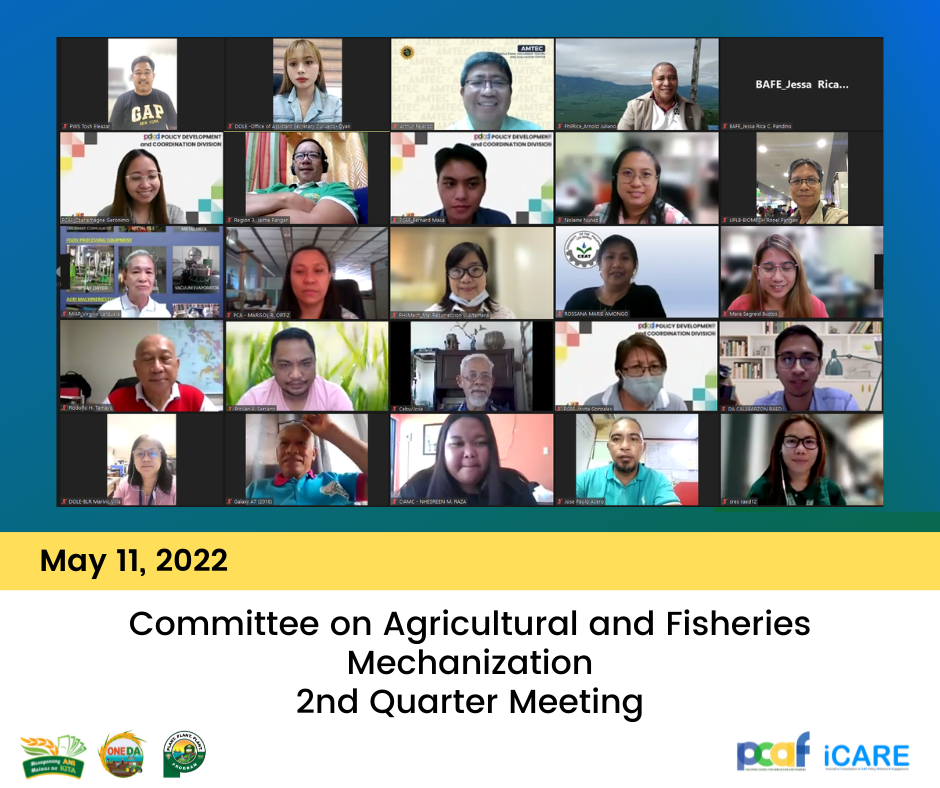
In the second regular meeting of the Committee on Agricultural and Fisheries Mechanization (CAFMech) on May 11, 2022, the Philippine Center for Postharvest Development and Mechanization (PhilMech) shared its plan to increase the agency’s engagement with local suppliers in procuring agri-fishery machinery and equipment.
In support of this and in strengthening the local manufacturing industry, the Committee passed a resolution that recommends to PhilMech the development of a procurement process that enables and promotes the participation of small manufacturers and fabricators in the acquisition of agri-fishery machineries under the Rice Competitiveness Enhancement Fund.
The Bureau of Agricultural and Fisheries Engineering (BAFE) also shared that it has current initiatives to support local manufacturers which include spearheading the establishment of Agri-Fishery Machinery and Equipment Service Centers and conducting training for the crafting of the Operator’s Manual.
Given the numerous agri-fishery mechanization programs, it was suggested for PhilMech to consolidate the budget proposals for research and development (R&D) of mechanization projects of all DA Regional Field Offices (RFOs) and attached bureaus, agencies, and corporations for easier and efficient fund utilization.
PhilMech was further requested to consider the agri-fishery mechanization technologies developed by the Philippine Rice Research Institute (PhilRice) for increased farmer adoption.
Also part of the meeting agenda was the discussion of the implementation status of DA Department Circular No. 01, series of 2019, or the Guidelines for the Implementation of Constructors’ Performance Evaluation System (CPES) at DA.
For 2022, the CPES Implementing Unit (IU) reported that it had already evaluated 10 DA infrastructure projects which included the Concreting of Sitio Bugkos in Brgy. La Granja Farm-to-Market Road (FMR) in Negros Occidental, the Construction of Warehouse with Training Hall and Farm Machinery Shed at Brgy. Navalas, Buenavista, Guimaras, and the Abaca Processing Center in Catanduanes among others.
Among the 10 evaluations conducted, only one (1) project received a “Very Satisfactory” rating while three (3) acquired “Satisfactory”, two (2) were “Unsatisfactory”, and four (4) were “Poor”.
Seeing the positive impact of CPES on DA infrastructure projects, the Committee agreed to recommend to the Philippine Council for Agriculture and Fisheries (PCAF) the creation of a CAFMech Task Force for Agri-fisheries Infrastructure to address concerns related to the implementation of DA-funded infrastructure projects.
On the same meeting, the Committee passed a policy resolution recommending to the DA Secretary the approval of the draft Guidelines on the Organization of Landless Farm Workers (LFWs) for dissemination to the Department of the Interior and Local Government, the Department of Labor and Employment, the Cooperative Development Authority, and the Technical Education and Skills Development Authority to solicit legal opinion from their respective legal offices.
The guidelines were drafted by another CAFMech Task Force, which was created as a recommendation in the PCAF commissioned policy study to the University of the Philippines Los Baños – Center for Agri-Fisheries and Biosystems Mechanization, entitled “Assessment and Analysis of the Effects of the Extensive Use of Mechanization on Farm Labor Use and Patterns: Study in Support for Policy on Sustainable Human Resource Development of the Agricultural Labor Sector”.
The general objective of the guidelines for the organization of LFWs is to specify the procedures and requirements for assisting LFWs in organizing themselves into formal groups which will enable access to institutional support and direct benefits from government subsidies and programs that are usually provided to farmer cooperatives and associations.
These guidelines also aim to identify and emphasize the roles and responsibilities of concerned government agencies and institutions which will help in building capabilities and empowering Filipino farmers and fisherfolk. | JCL











